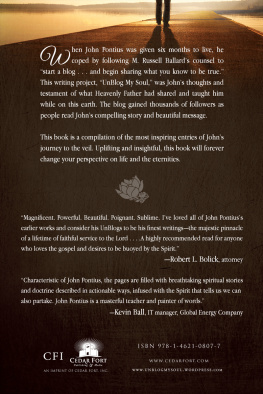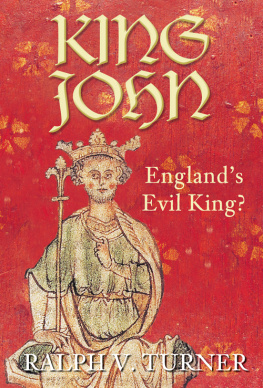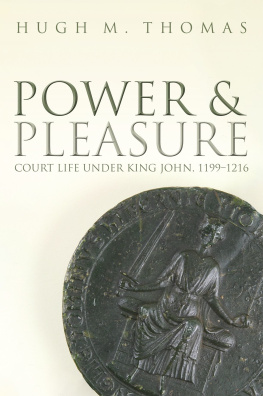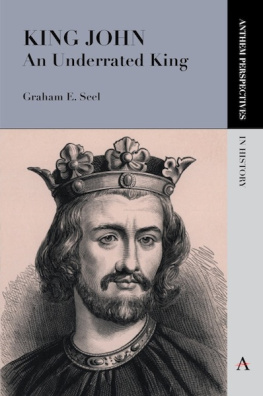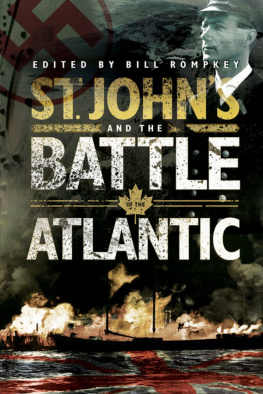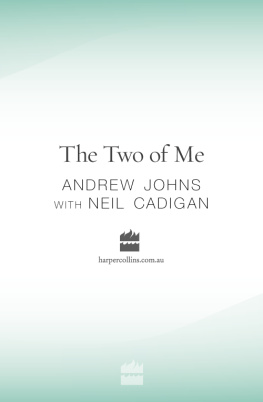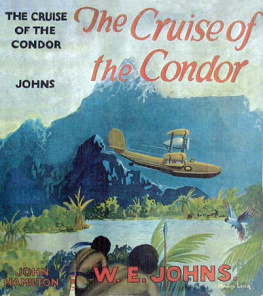KING JOHN (MIS)REMEMBERED
For my Mother and Father, with gratitude
King John (Mis)Remembered
The Dunmow Chronicle, the Lord Admirals Men, and the Formation of Cultural Memory
IGOR DJORDJEVIC
York University, Canada
ASHGATE
Igor Djordjevic 2015
All rights reserved. No part of this publication may be reproduced, stored in a retrieval system or transmitted in any form or by any means, electronic, mechanical, photocopying, recording or otherwise without the prior permission of the publisher.
Igor Djordjevic has asserted his right under the Copyright, Designs and Patents Act, 1988, to be identified as the author of this work.
Published by
Ashgate Publishing Limited
Wey Court East
Union Road
Farnham
Surrey, GU9 7PT
England
Ashgate Publishing Company
110 Cherry Street
Suite 3-1
Burlington, VT 05401-3818
USA
www.ashgate.com
British Library Cataloguing in Publication Data
A catalogue record for this book is available from the British Library.
The Library of Congress has cataloged the printed edition as follows:
Djordjevic, Igor.
King John (mis)remembered : the Dunmow Chronicle, the Lord Admirals men, and the formation of cultural memory / by Igor Djordjevic.
pages cm
Includes index.
ISBN 978-1-4724-6204-6 (hardcover)ISBN 978-1-4724-6205-3 (ebook)ISBN 978-1-4724-6206-0 (epub) 1. John, King of England, 11671216In literature. 2. John, King of England, 11671216Influence. 3. Kings and rulers in literature. 4. Literature and societyGreat BritainHistory. 5. Collective memory and literatureGreat Britain. 6. Great BritainHistoryJohn, 11991216Historiography. I. Title.
PR151.K55D56 2015
820.9351dc23
2015000504
ISBN 9781472462046 (hbk)
ISBN 9781472462053 (ebk-PDF)
ISBN 9781472462060 (ebk-ePUB)
Contents
List of Figures
.
.
.
.
.
Note on the Text
In all quoted passages from various early modern chronicles, poems, and play texts that do not exist in modern critical editions, I have preserved the orthography of the original printed editions, with the exception of the silent expansion of abbreviations and ligatures (excluding ampersands), for the convenience of the modern reader. In my discussion I differentiate between the spellings of characters names depending on the text in which they appear. Whenever referring to the historical persons, I use the modernized forms of their namesas established by the common usage of modern historians. When referring to the various poets and playwrights literary adaptations of these historical characters, however, I employ the spellings from the early modern print editions. This convention will make it easy to distinguish between historical persons such as the French Dauphin Louis, the papal legate Pandulf, or Robert FitzWalter and his daughter Matilda, from their respective literary avatars named Lewis, Pandolf, and Fitzwater. It will likewise enable us to differentiate between the particular literary adaptations of the historical characters, as in the case of Peeles Pandulph and Shakespeares Pandolf, Peeles and Shakespeares Falconbridges and the anonymous Lord Admirals Mens playwrights Faukenbridges, or of the de Braose family who appear as the individualized Bruce or Bruse clans in Mundays and Davenports plays. In each case, my adoption of a variant spelling refers to an authorial interpretive rendition of a character who also had an existence independent of these poetic and dramatic works.
Acknowledgments
I am grateful to Glendon College and York University for supporting the sabbatical research project that resulted in this book, and to the staff of Frost Library at York University for their assistance and enduring patience with my requests for resources from other universities. An even greater debt of gratitude is owed to Early English Books Online (EEBO) which provided me with most of the texts studied in this volume. I offer my warm thanks to the good people of Little Dunmow, Essex, who welcomed me into their midst as I pursued the Matilda FitzWalter legend, and among them particularly to the caretakers of the Priory Church of St Mary the Virgin who allowed me unrestricted access to the church in August 2013. My undying love to my little boys, Lucas and Jacob, who endured several months without me while I trailed King John across England, with boundless gratitude for their supportive, cheerful smiles and curious inquisitiveness while the King John thing took shape in a book. Last, but certainly not least, my love and thanks to Lesley, for her year-long patient indulgence of and support for my obsession with a medieval English king, and for the advice that proved far more important than she could ever imagine.
Introduction
Of Critics and Dashed Scholarly Expectations
Almost a quarter of a century ago, in the introduction to his landmark book Forms of Nationhood, Richard Helgerson confessed his many scholarly surprises at discovering the particular connections of discursive and political meaning in the works of disparate genres that he was considering, and went on to explain how he didnt expect or didnt anticipate certain findings, and neither expected nor wanted to make a particular argument. These statements by one of the greatest scholars of his generation set the stage for what I shall be discussing in the following pages.
In many ways this is a book about audience expectations. In Holinsheds Nation I studied the various early modern interpretive communities that derived from the texts they read about their national past meanings relevant to them in their presentto explain to themselves what made them who they were and what it meant to be Englishbut modern scholars are an even more distinct interpretive community of readers of the same texts because they overtly and unabashedly inscribe meanings on them. The main difference between the two communities of readers most often boils down to the fact that modern scholars approach these texts with distinct sets of expectations. Of course, this is the conditio sine qua non of scholarly researchto ask a question and pursue the trail of crumbs to its answer, regardless of how winding it may be, or through whatever deep dark thickets of the intellectual woods it may lead. But sometimes scholars choose a particular path, or select to follow some crumbs and not others, based on theoretical constructs unknown and unimaginable to the authors and their original audiences in the sixteenth and seventeenth centuries. Equally often, thanks to twenty-twenty historical hindsight, modern scholars tend to find patterns where none may have been intended, to elevate coincidences to particular eminence, and to connect the disparate dots unearthed by their research in ways that reflect the dominant literary theoretical approach in vogue at the time when they set pen to paper.
Consider, for example, Brian Boyds remarks about The Troublesome Reign of King John: it seems strange in the extreme that a play that aims to exalt John for his defiance of the Pope should take extraordinary pains to refocus Holinsheds materials around the death of Arthur. Tillyard may have had a diverse set of texts upon which he attempted to construct an all-encompassing description of a culturea set of dots he connected, so to speak, to create an Elizabethan World Picturebut Boyds argument rests on the authors assumption that the eulogizing motive of early English historical drama, especially in plays dealing with King John, is a truism that needs no further elaboration.
Next page

